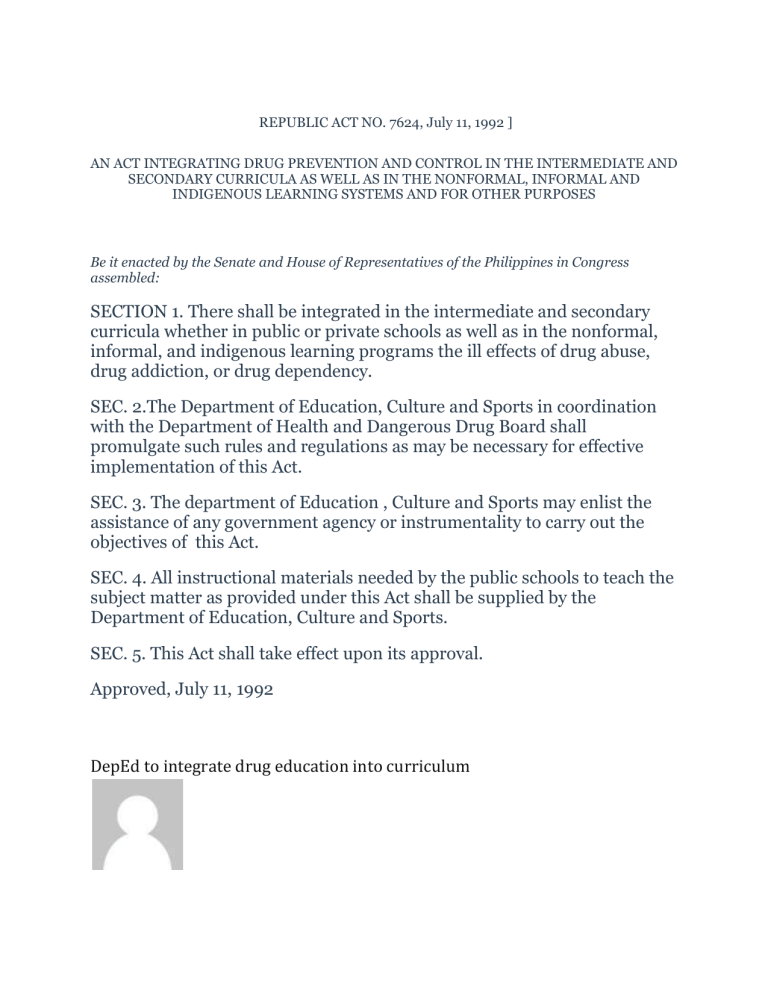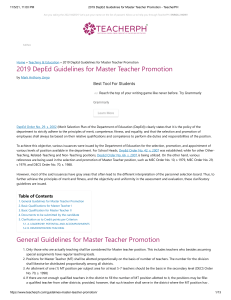
REPUBLIC ACT NO. 7624, July 11, 1992 ] AN ACT INTEGRATING DRUG PREVENTION AND CONTROL IN THE INTERMEDIATE AND SECONDARY CURRICULA AS WELL AS IN THE NONFORMAL, INFORMAL AND INDIGENOUS LEARNING SYSTEMS AND FOR OTHER PURPOSES Be it enacted by the Senate and House of Representatives of the Philippines in Congress assembled: SECTION 1. There shall be integrated in the intermediate and secondary curricula whether in public or private schools as well as in the nonformal, informal, and indigenous learning programs the ill effects of drug abuse, drug addiction, or drug dependency. SEC. 2.The Department of Education, Culture and Sports in coordination with the Department of Health and Dangerous Drug Board shall promulgate such rules and regulations as may be necessary for effective implementation of this Act. SEC. 3. The department of Education , Culture and Sports may enlist the assistance of any government agency or instrumentality to carry out the objectives of this Act. SEC. 4. All instructional materials needed by the public schools to teach the subject matter as provided under this Act shall be supplied by the Department of Education, Culture and Sports. SEC. 5. This Act shall take effect upon its approval. Approved, July 11, 1992 DepEd to integrate drug education into curriculum ByOFELYN DATUIN April 16, 2019 The Department of Education (DepEd) plans to integrate the government’s drug education program into the curriculum in the coming school year. During the 1st 2019 Balik Eskwela orientation on Monday, Glene Basio, supervising education program specialist of the Bureau of Curriculum Development, presented the drug education program that President Rodrigo Duterte has been pushing since the start of his term. The program is based on RA 7624 of 1992 or “an act integrating drug prevention and control in the intermediate and secondary curricula as well as in non-fornal, informal, and indigenous learning systems and for other purposes” and RA 9165 or the “Comprehensive Dangerous Drug Act of 2002.” Basio explained that the department preferred to integrate the drug program in appropriate classes rather than introducing it as a subject. The drug program would be implemented in different stages. Kinder to Grade 3 pupils will learn about healthy habits, safety practices, correct use of medicine and personal wellness. Grades 4 to 6 pupils will have lessons on how to be healthy and drug-free by understanding the consequences of substances that threaten health and safety. Grades 7 to 10 students will be taught the consequences of using substances based on drug control laws, policies and programs, while those in Grades 11 to 12 will be taught life skills to sustain a healthy and drug-free life and to promote wellness as a way of life. At present, the DepEd is developing an updated comprehensive supplemental drug program in cooperation with the Department of Health, the Dangerous Drugs Board and other experts




